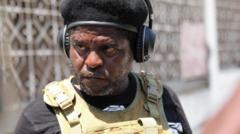A series of violent incidents tied to illegal armed groups have brought renewed chaos to southwestern Colombia, prompting concerns over escalating security risks.
Deadly Wave of Violence Strikes Southwestern Colombia

Deadly Wave of Violence Strikes Southwestern Colombia
At least four fatalities reported following bomb and gun attacks targeting civilians and police.
At least four people have been killed in a series of violent bomb and gun attacks in southwestern Colombia, local media outlets report. The violence, which has particularly affected the city of Cali and its surrounding areas, has reportedly claimed the lives of two police officers among the casualties.
The attacks, described as a coordinated wave of terror, involved car bombs, motorcycle explosives, and rifle fire, with potential use of a drone, as confirmed by preliminary reports. The Colombian Ministry of Defence has acknowledged a total of 19 attacks, revealing that 12 occurred in the Cauca region and seven in Valle del Cauca, emphasizing a pattern of insecurity taking hold in these regions.
While local media suggest links between the violence and factions of the Revolutionary Armed Forces of Colombia (FARC), the situation remains dynamic, and further verification is pending. These attacks targeted police stations, government buildings, and civilian areas, exacerbating the ongoing security crisis as fears escalate regarding the deteriorating state of safety in the country.
The Defence Ministry described this violent reaction as a response by illegal armed groups to intensified military operations aimed at dismantling their illicit activities and economic structures. In a stark comparison, the mayor of Cali likened the city’s current situation to that of 1989, a period notorious for drug-related conflicts and cartel violence.
These events follow a concerning attempted assassination of presidential candidate Miguel Uribe Turbay in Bogotá just days prior, during which a 15-year-old suspect was apprehended. The Attorney General’s office has reported that the youth has denied the charges of attempted murder and possession of a firearm, while a judge has ordered his detention as investigations continue.
The growing wave of violence indicates a critical moment for Colombia, where public safety and political stability are at significant risk. The government now faces the urgent task of addressing these violent outbreaks and the broader implications for the nation's future.
The attacks, described as a coordinated wave of terror, involved car bombs, motorcycle explosives, and rifle fire, with potential use of a drone, as confirmed by preliminary reports. The Colombian Ministry of Defence has acknowledged a total of 19 attacks, revealing that 12 occurred in the Cauca region and seven in Valle del Cauca, emphasizing a pattern of insecurity taking hold in these regions.
While local media suggest links between the violence and factions of the Revolutionary Armed Forces of Colombia (FARC), the situation remains dynamic, and further verification is pending. These attacks targeted police stations, government buildings, and civilian areas, exacerbating the ongoing security crisis as fears escalate regarding the deteriorating state of safety in the country.
The Defence Ministry described this violent reaction as a response by illegal armed groups to intensified military operations aimed at dismantling their illicit activities and economic structures. In a stark comparison, the mayor of Cali likened the city’s current situation to that of 1989, a period notorious for drug-related conflicts and cartel violence.
These events follow a concerning attempted assassination of presidential candidate Miguel Uribe Turbay in Bogotá just days prior, during which a 15-year-old suspect was apprehended. The Attorney General’s office has reported that the youth has denied the charges of attempted murder and possession of a firearm, while a judge has ordered his detention as investigations continue.
The growing wave of violence indicates a critical moment for Colombia, where public safety and political stability are at significant risk. The government now faces the urgent task of addressing these violent outbreaks and the broader implications for the nation's future.




















